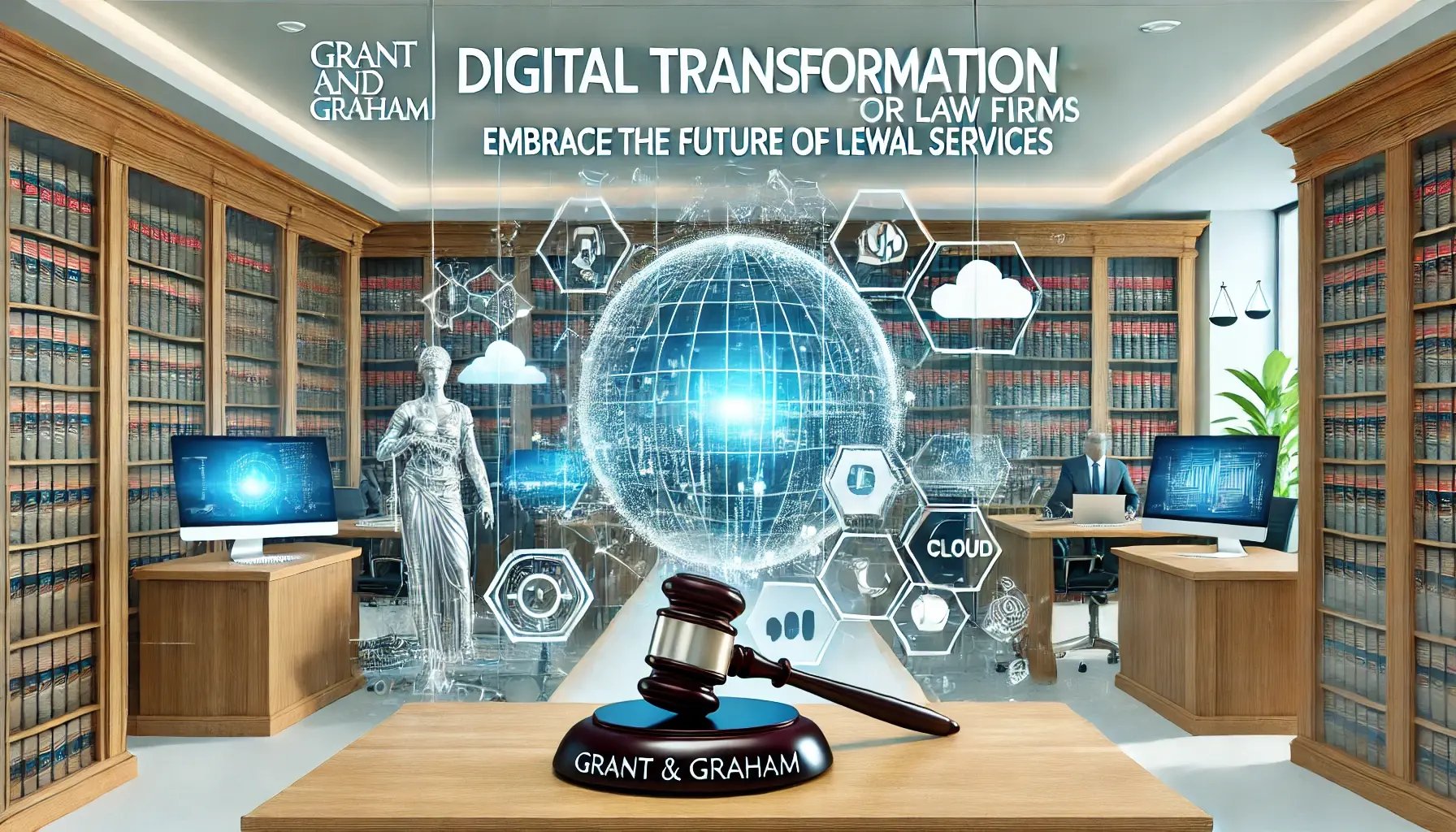Digital Transformation in Law Firms: Enhancing Efficiency and Client Service
 In a rapidly evolving world, where technological advancements are reshaping industries across the board, law firms are no exception. Digital transformation is no longer a luxury but a necessity for legal institutions to stay competitive, agile, and client-focused. By leveraging technology, law firms can enhance their service delivery, improve efficiency, and position themselves for long-term growth. But what does digital transformation look like in a law firm setting, and how can it be successfully implemented?
In a rapidly evolving world, where technological advancements are reshaping industries across the board, law firms are no exception. Digital transformation is no longer a luxury but a necessity for legal institutions to stay competitive, agile, and client-focused. By leveraging technology, law firms can enhance their service delivery, improve efficiency, and position themselves for long-term growth. But what does digital transformation look like in a law firm setting, and how can it be successfully implemented?
Why Digital Transformation Matters for Law Firms
Traditionally, the legal profession has been seen as a conservative industry, often slower to adopt change compared to others. However, the complexities of modern legal practice, coupled with client expectations for faster, more transparent services, are pushing firms to evolve.
Key drivers for digital transformation include:
- Client Expectations: Clients demand real-time updates, cost predictability, and seamless communication.
- Operational Efficiency: Automating repetitive tasks allows lawyers and support staff to focus on higher-value work.
- Data Security and Compliance: Advanced technologies enable better handling of sensitive information, reducing risks and ensuring compliance with ever-evolving regulations.
- Competitive Edge: Firms that embrace technology can differentiate themselves through innovation, delivering smarter and faster legal solutions.
Key Areas of Digital Transformation in Law Firms
-
Case and Document Management Legal practice generates an overwhelming volume of documents. Modern solutions like AI-powered document management systems can streamline storage, retrieval, and analysis of case files. Tools like Optical Character Recognition (OCR) enable faster review and categorization of legal documents.
-
Client Relationship Management (CRM) Adopting CRM systems tailored to legal services, such as HubSpot or Salesforce, allows firms to track client interactions, manage business development efforts, and provide personalized service.
-
Billing and Financial Management Platforms like 3E Elite simplify complex billing processes, offer transparency in financial operations, and ensure compliance with regulatory standards. Implementing a matter access solution can further enhance control and efficiency.
-
Process Automation Technologies like Robotic Process Automation (RPA) automate routine tasks such as invoice processing, conflict checks, and contract review. This not only improves accuracy but also saves valuable time.
-
AI and Predictive Analytics Artificial Intelligence (AI) tools can analyze case precedents, predict outcomes, and provide insights that empower lawyers to strategize effectively. Predictive analytics also aid in resource allocation and identifying business opportunities.
-
Collaboration Tools Platforms such as Microsoft Teams or Slack, integrated with case management systems, enable seamless communication between lawyers, clients, and support staff, especially in remote or hybrid work environments.
-
Data Security With cyber threats becoming increasingly sophisticated, law firms must invest in robust cybersecurity solutions to protect client confidentiality. Tools like ‘NeedToKnowAccess’ ensure only authorized personnel can access sensitive information.
Challenges to Overcome
While the benefits of digital transformation are clear, law firms face unique challenges in the journey:
- Cultural Resistance: Many legal professionals are accustomed to traditional methods and may resist adopting new tools.
- Initial Investment: Implementing advanced technologies can require significant upfront costs.
- Data Migration: Transitioning from legacy systems to modern platforms is often a complex and time-intensive process.
- Training: Ensuring staff are adequately trained to use new tools is essential for maximizing ROI.
Best Practices for Successful Transformation
-
Leadership Commitment Transformation begins at the top. Senior leaders must champion the change, communicating its importance and aligning the firm's vision with digital goals.
-
Client-Centric Approach Digital initiatives should enhance the client experience. Regular feedback loops can help firms adapt their strategies to meet client needs.
-
Change Management Frameworks Models like ADKAR can guide firms in addressing resistance, ensuring smooth transitions, and embedding lasting change across teams.
-
Incremental Implementation Instead of attempting a complete overhaul, law firms should prioritize high-impact areas and adopt a phased approach.
-
Partnering with Experts Collaborating with technology consultants or vendors who understand the legal industry can expedite the transformation process.
The Future of Digital Law Firms
Digital transformation is more than adopting new technology—it’s about reimagining how legal services are delivered. Firms that embrace this shift stand to improve client satisfaction, attract top talent, and thrive in a competitive landscape.
As the industry continues to evolve, law firms have an unprecedented opportunity to combine their legal expertise with technological innovation, ensuring they not only meet the demands of today but are also prepared for the challenges of tomorrow.
At Grant and Graham, we specialize in guiding law firms through their digital transformation journey. From process automation and system integration to change management and compliance, we help legal organizations embrace innovation and achieve sustainable growth.
Learn more about how we can support your firm at www.grant-graham.co.uk.
Grant and Graham – Bringing Law Firms Into the Future.



